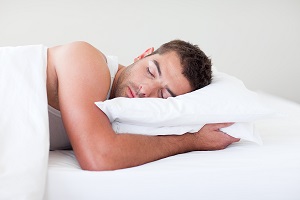
Scientists took measurements of the brain waves of 26 older adults who did not have Alzheimer’s while they were sleeping. They found that the ones who did not sleep well had brains with more amyloid plaques in them than did the ones who slept well. The researchers also found that the adults who slept poorly and had amyloid plaques did worse on memory tests administered both before and after sleep.
How does sleep deprivation cause brain damage?
The brain needs sleep in order to maintain metabolic homeostasis. Prolonged wakefulness stresses the mitochondria in our cells, and sleep deprivation cases neurons to degenerate.
In one study involving mice, the scientists kept them on an inconsistent and erratic sleep schedule akin to that experienced by many human shift workers. The mice suffered significant and irreversible brain damage, for 25 percent of the neurons in their locus coeruleus decayed. The locus coeruleus is a part of the brain stem that controls wakefulness, arousal and some cognitive processes. Scientists have also found that the brain shrinks over time in someone who doesn’t get enough sleep. The process is quicker and more severe in people over 60.
In addition, the lymphatic system and the brain’s glial cells work together to clean toxins and waste out of the brain. They do most of their work at night. In fact the glial cells and lymphatic system are ten times more active during a person’s sleep than during their waking hours. Among the toxins they clear out are proteins linked to Alzheimer’s.
Researchers studied yet more mice and divided them into two groups. One group was exposed to 12 hours of darkness and 12 hours of light while the other group was exposed to 4 hours of darkness and 20 hours of light. Both groups were bred to develop dementia and had amyloid plaques, but the second group displayed more and more severe memory problems. The researchers concluded that insomnia is a trigger of the processes that cause dementia to develop.
Sleep problems in the US
Many Americans sleep poorly. Forty percent of the country’s adults have reported falling asleep during the daytime without meaning to, and another 5 percent have reported falling asleep while driving. Some people do have sleep disorders, but many others simply don’t go to bed early enough.
Other health problems caused by insomnia
Lack of sleep affects the immune system in the same way that chronic stress and illness do. Sleep deprivation increases the chances of developing certain chronic illnesses. For example, the risk of developing high blood pressure is tripled in people who sleep less than six hours per night. Insomnia also increases the chances of developing cancer, slows down neuron production in the brain, and contributes to premature aging.
Tips for getting a good night’s sleep
- Stop watching TV or using the computer an hour before bedtime.
- Sleep in complete darkness.
- Keep the temperature in the bedroom below 70 degrees. The optimal temperature for sleeping is between 60 and 68 degrees.
For more articles go to http://lifesportfitness.lifestyleezine.com

 Getting better sleep seems to be something many people in busy Silicon Valley should focus on. Not being able to sleep is frustrating, and lack of adequate sleep can lead to serious health problems. Your body needs at least 6 hours of sleep every night in order to be active again the next day.
Getting better sleep seems to be something many people in busy Silicon Valley should focus on. Not being able to sleep is frustrating, and lack of adequate sleep can lead to serious health problems. Your body needs at least 6 hours of sleep every night in order to be active again the next day.